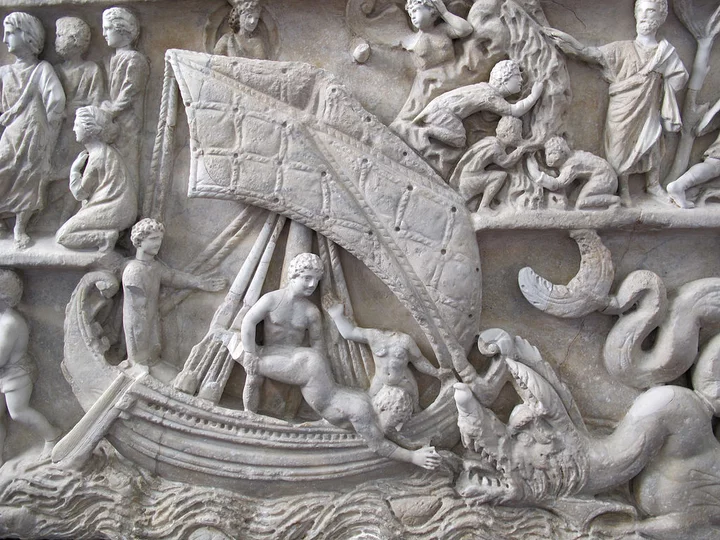A mope gets the heave-ho. Image: Sailko, CC BY 3.0, via Wikimedia Commons
PREVIOUSLY:
###
Wow, you’ve been through some hard stuff, haven’t you? Loss seems to follow you, or maybe it’s that one loss that seems to define you, mapping your path through grief or blame or resentment. “Until we make the unconscious conscious, it will direct our life, and we will call it fate,” psychologist Carl Jung once wrote.
A lot of us do this often – make the big fish of our life into our entire storyline (as I mused in last week’s post on the biblical book of Jonah). Sometimes this big fish becomes everything for us, and all we can see. But sometimes it can also become a turning point. Sometimes venturing into the big fish, that depth of insurmountable loss, is what invited change.
I’ve found it’s often in those deepest places, way down to the bottom of myself, that I realize God has been with me the whole time – at the bottom of the barrel and the end of my rope. When I’m in a place of desperation, there’s nowhere left to turn but to God.
Jonah found God in the deep, when everything else was gone. The Hebrew word, yarad, is used three times in this chapter of Jonah. It means to go down or to sink. It’s like the writer wants us to visualize sinking. Sinking can be something that happens to us and it can also be something that we allow to happen to us. Sometimes we sink to avoid reality and responsibility, and sometimes we sink because we’ve been pushed down.
Jonah sank to avoid. He got on that ship to avoid what he was asked to do: to warn Nineveh. But as he sailed away from the direction he was supposed to go, the wind and the waves became so destructive that the sailors began throwing their livelihood and financial well-being overboard just to survive. And Jonah responds by totally avoiding all the communal emotional turmoil and fear by sinking below deck. As these sailors were struggling and shouting and praying, Jonah says, “Peace out” and sinks to the bottom of the ship to sleep it off.
Sometimes when life feels like it’s too much because of our own choices — the million little harmful decisions that have grown into a huge storm — it feels easier to numb and avoid and ignore the chaos we’ve created around ourselves, like we’re sinking to the bottom and going to sleep so we can avoid the destruction we’ve caused. And our people, those we love and those we might not even know, currently live through and feel the consequences of our choices while we sleep it off.
I’ve found that once I realize the destruction my choices have caused, there’s this temptation to believe I’m worthless or no good. Instead of seeking forgiveness or admitting wrongs, some people tend to deflect and choose not to take responsibility, which is what Jonah does after the sailors discover the storm was his fault. He simply tells them the good Sunday School answer that he worships the God of heaven who made the sea and dry land, like he’s spouting off John 3:16 from memory but has never taken it to heart.
Jonah knows the right words to say but they seem to mean nothing to him.
And he says, “Fine, throw me overboard because I’m no good and worthless.” Not, “I shouldn’t have brought you into this and I’m sorry for the harm I’ve caused you.”
So they throw him overboard and this big fish swallows Jonah and becomes his temporary home.
(I know, I know. Why would anyone believe such a far-fetched story? You might not. No big deal! But there’s a type of wisdom we can apply from ancient stories written thousands of years ago).
I see the big fish as an act of grace and mercy. God didn’t have to rescue Jonah or even need to empower this whiny, self-absorbed, small-minded man to accomplish anything. And I don’t think God was surprised by Jonah going the opposite direction — to jump overboard, to sink below and do anything it took to avoid this invitation.
For three days and nights, I imagine Jonah sitting in his thoughts and replaying his life like a movie. Jonah’s life wasn’t this tiny snapshot we get here. His life contained loss, death, rejection, infidelity, falling in love, disappointment, abuse, weddings and celebrations, hangovers, embarrassing moments, dread and fear, arguments, worship, prayer, dinner parties – you know, everything your life contains.
Over three days he thought about his life and he began to wake up to what was instead of what wasn’t. He’d been sleepwalking through his life, simply existing in his relationships, in his faith, in his work.
If you got alone for three days and nights with only your thoughts and prayers, what would you wake up to? Have you been slogging through your relationships? Numbing out through mindless scrolling? Being physically present but not actually connected? What might your unconscious becoming conscious show you if you sat in the lonely silence for a while?
(You are beloved.)
I don’t know why that loss has demanded so much from you these years, but I do know it’s not your whole story, and to sink into numbing sleep to avoid that storm isn’t helping anymore. But it can be in those dark places of loss, the ones at the end of your rope, where Love and grace meets you and wakes you up to re-engage your life once again.
###
Bethany Cseh is a pastor at Arcata United Methodist Church and Catalyst Church. Follow her on Instagram.

CLICK TO MANAGE